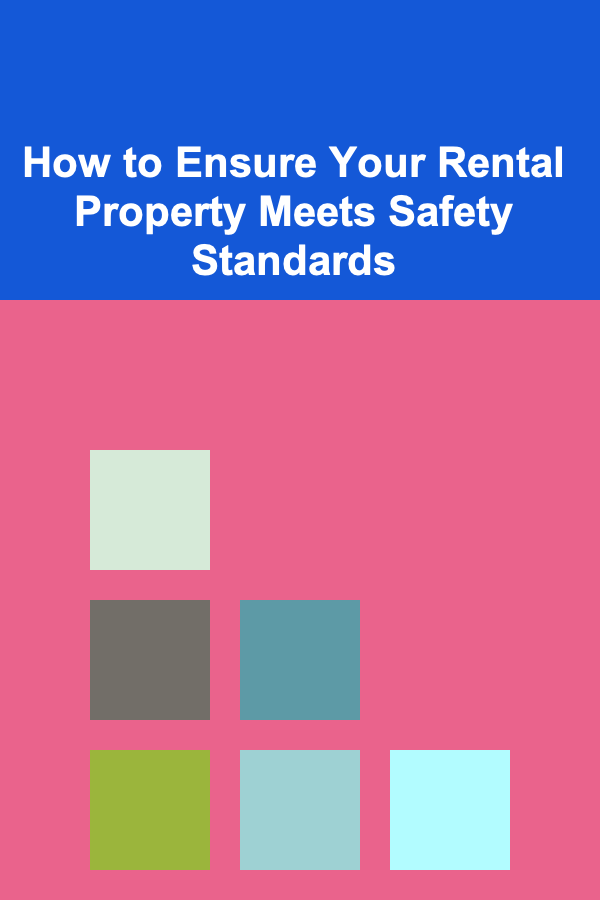
How to Ensure Your Rental Property Meets Safety Standards
ebook include PDF & Audio bundle (Micro Guide)
$12.99$10.99
Limited Time Offer! Order within the next:

Owning and renting out a property comes with numerous responsibilities, among the most important being ensuring the safety and security of tenants. A safe rental property not only protects your tenants but also ensures compliance with legal standards and reduces your risk of liability. Many property owners overlook safety, but it should be one of the first things to address before leasing a unit.
This article will explore in-depth how to ensure your rental property meets safety standards, examining key areas of concern, relevant laws, and practical steps you can take to make sure your property is both safe and legally compliant.
Understand Local and National Safety Regulations
Before diving into the specifics of safety standards, it's essential to understand that there are local, state, and national regulations that may affect your rental property. These laws and regulations are in place to protect tenants from preventable accidents and hazards. Failing to comply with them can result in penalties, legal disputes, or even losing your property management license.
1.1. Fire Safety Standards
One of the most important safety standards for rental properties is ensuring fire safety. According to national fire safety regulations, such as those outlined by the National Fire Protection Association (NFPA) in the United States, certain measures must be taken to protect tenants from fire hazards.
- Smoke Detectors: Every rental property must be equipped with working smoke detectors. Smoke alarms should be installed on every level of the property, including in bedrooms and hallways.
- Carbon Monoxide Detectors: If your rental property uses gas-powered appliances, a carbon monoxide detector is essential to detect harmful gas emissions.
- Fire Extinguishers: Fire extinguishers should be easily accessible in kitchens, near exit points, and in any other high-risk areas.
- Fire Escape Plans: Ensure that tenants are aware of emergency exits and evacuation routes. Signage indicating these routes can help in case of an emergency.
1.2. Electrical Safety Standards
Electrical hazards are one of the leading causes of home fires. Ensuring that your property's electrical system meets national and local codes is essential to avoid risks like electrocution and fires.
- Circuit Breakers and Wiring: Ensure that the electrical system, including wiring and circuit breakers, is up to code. If the property is older, consider having a licensed electrician inspect and upgrade the system as needed.
- GFCI Outlets: Ground Fault Circuit Interrupter (GFCI) outlets should be installed in areas with high moisture levels, such as kitchens, bathrooms, and outdoor spaces.
- Extension Cords and Overloading: Instruct tenants to avoid overloading circuits and discourage the use of multiple extension cords, which can lead to overheating and fire.
1.3. Building Codes and Structural Safety
Building codes are laws that ensure the structural integrity of a property. Your rental property should comply with all local building codes to prevent potential hazards like collapsed ceilings, unsafe stairs, or failing foundations.
- Structural Integrity: Hire a professional to inspect the foundation, roofing, and walls regularly. Look for signs of damage, such as cracks, leaks, or water infiltration.
- Balconies and Decks: Balconies and decks are especially prone to wear and tear. Ensure that they are properly supported, regularly maintained, and that railings are secure.
- Stairways and Handrails: Ensure stairways and handrails are in good condition and meet the building code requirements for height, strength, and spacing.
1.4. Health and Sanitation Standards
Health and sanitation standards are often overlooked but are vital for ensuring the well-being of tenants. Local regulations may specify the conditions of your property, particularly when it comes to things like mold, pests, and ventilation.
- Mold and Dampness: Mold can cause severe health issues, and any rental property should be free from mold growth. Ensure that the property is well-ventilated, especially in areas like bathrooms and kitchens.
- Pest Control: Regular pest control inspections and treatments should be carried out to ensure that tenants are not exposed to insects or rodents.
- Plumbing: Regularly check plumbing for leaks, low water pressure, and faulty pipes, which could result in water damage or contamination.
1.5. Disability and Accessibility Standards
If your rental property is being rented to individuals with disabilities, you may need to comply with accessibility standards such as those outlined in the Americans with Disabilities Act (ADA) in the U.S., or similar regulations in other countries. These rules ensure that tenants with mobility impairments have safe and easy access to their living spaces.
- Ramps and Elevators: If your rental property has multiple floors, consider installing an elevator or at least a wheelchair ramp at the entrance to the building.
- Wider Doorways: If possible, widen doorways to accommodate wheelchairs or other mobility aids.
- Accessible Bathrooms and Kitchens: Modify bathrooms and kitchens so they are accessible to individuals with disabilities, including installing grab bars, lower counters, and other accessible features.
Routine Inspections and Maintenance
Regular property inspections are crucial to identifying hazards and addressing them before they become serious issues.
2.1. Periodic Safety Inspections
It's essential to schedule regular safety inspections throughout the year. An annual inspection of fire alarms, carbon monoxide detectors, and electrical systems should be conducted by a licensed professional. As part of these inspections, check for compliance with local building codes, proper functioning of all safety features, and overall cleanliness.
- Inspection Checklist: Create a comprehensive checklist to follow during inspections. This should include the status of smoke detectors, fire extinguishers, electrical outlets, plumbing, and structural integrity.
- Tenant Feedback: Encourage tenants to report any potential hazards or maintenance issues, such as flickering lights, water leaks, or broken locks. Prompt responses to their concerns show that you are invested in their safety.
2.2. Preventive Maintenance
Maintaining the property regularly can reduce the risk of accidents. For example, routine roof inspections, cleaning gutters, and servicing HVAC systems will ensure that your property remains safe and functional. Keep landscaping in check as well to avoid overgrown bushes that could obstruct walkways or hiding places for intruders.
- Weatherproofing: Ensure that windows, doors, and roof seals are intact to prevent water damage, which can lead to mold or structural weakening. This also helps to maintain tenant comfort by preventing drafts.
- Hazardous Materials: Test for hazardous materials like lead paint or asbestos, particularly in older properties. These can be harmful to both tenants and workers if not handled appropriately.
2.3. Pest Control
Pests like termites, rats, and bedbugs can present significant health and safety risks. Regular pest control and maintenance should be part of your standard property management practices. Pest control not only protects the building from damage but also ensures that tenants are living in a clean and healthy environment.
- Extermination Services: Hire a licensed pest control service for regular treatments to keep your property free of pests. If a tenant reports a pest issue, address it immediately.
Legal Considerations and Insurance
Compliance with safety standards is not just about preventing accidents---it also protects you legally. Ensuring your rental property meets safety standards can minimize your liability in the event of an accident.
3.1. Renters' Insurance Requirements
While landlords are responsible for maintaining the property in a safe condition, tenants also play a role in protecting their belongings. Renters' insurance is a critical element in the overall safety of your rental property. Require your tenants to carry renters' insurance, which can cover their personal property in case of theft, fire, or vandalism.
3.2. Liability Insurance for Landlords
In addition to renters' insurance, landlords should also have liability insurance to protect themselves from lawsuits related to injuries that occur on their property. This coverage can help with medical costs, legal fees, and other damages resulting from accidents.
3.3. Complying with Fair Housing Laws
When managing your rental property, you must also comply with fair housing laws, which prohibit discrimination based on race, color, national origin, religion, sex, familial status, or disability. It's essential to ensure that your property is accessible to all individuals and that you are providing a safe living environment for everyone, regardless of their background.
Communicating Safety Measures to Tenants
One of the key aspects of property management is communicating safety standards clearly to your tenants. Not only does this demonstrate that you take their well-being seriously, but it also helps set expectations and reduce potential misunderstandings.
4.1. Providing Safety Instructions
Upon moving in, provide tenants with a detailed safety manual that outlines the following:
- Fire escape routes
- Emergency contact numbers
- Information about security systems, locks, and alarms
- Instructions for using fire extinguishers and other safety equipment
4.2. Keeping Tenants Informed About Inspections
Inform tenants in advance of scheduled safety inspections or maintenance work. This gives them the opportunity to raise any concerns and ensures that they are aware of the potential for minor disruptions during inspections or repairs.
Conclusion
Ensuring your rental property meets safety standards is a vital responsibility for any landlord. From complying with fire safety and electrical standards to conducting regular maintenance and inspections, safety should always be a top priority. Not only does this protect your tenants and help prevent accidents, but it also ensures legal compliance and reduces your risk of liability.
By staying on top of safety standards, maintaining the property, and keeping clear communication with your tenants, you can provide a safe living environment and foster positive relationships with your tenants, which will ultimately lead to a successful rental business.
Reading More From Our Other Websites
- [Gardening 101] Seasonal Garden Decor: How to Keep Your Garden Stylish Year-Round
- [Personal Care Tips 101] How to Choose the Best Hair Gel for Your Hair Type and Style
- [Hiking with Kids Tip 101] How to Create a Kid‑Centered Hiking Checklist That Keeps Everyone Organized and Happy
- [Home Maintenance 101] How to Maintain Your Home's Septic System Properly
- [Organization Tip 101] Top Tips for Preparing Walls Before Painting
- [Home Space Saving 101] How to Live Large in Small Spaces: Essential Tiny Living Hacks for Apartment Dwellers
- [Organization Tip 101] How to Create a Comprehensive Emergency Kit Checklist
- [Home Security 101] How to Use Video Doorbells to Enhance Your Home Security
- [Personal Finance Management 101] How to Maximize Your Retirement Contributions for Early Retirement
- [Home Lighting 101] How to Achieve a Rustic Lighting Look in Your Home

How to Improve Your Writing Speed and Make More Money
Read More
How to Set the Right Lighting for a Dinner Party
Read More
How to Use Floating Shelves to Free Up Floor Space
Read More
How to Use Pinterest for Organizing Hobby Ideas
Read More
How to Find Peace in the Mountains of Switzerland
Read More
How to Build VR Experiences for Theatrical Productions
Read MoreOther Products

How to Improve Your Writing Speed and Make More Money
Read More
How to Set the Right Lighting for a Dinner Party
Read More
How to Use Floating Shelves to Free Up Floor Space
Read More
How to Use Pinterest for Organizing Hobby Ideas
Read More
How to Find Peace in the Mountains of Switzerland
Read More